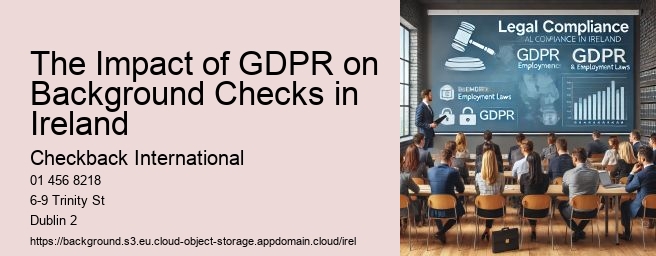

Overview of Pre Employment Checks in Ireland Pre-employment checks in Ireland verify candidates' backgrounds to determine the accuracy of information they provide. These background checks help organizations confirm identity, employment history, and educational qualifications.
Different Types of Background Checks
Key aspects of Consumer Credit Stress Checks include:
Employers can review public social media profiles but must follow data protection laws and get clear permission from job candidates.
The vetting process includes screening checks managed through a personal approach, collecting additional information when needed.
2.Organizations keep secure storage systems with appropriate access controls and data encryption measures.
Customer service: Strong support teams provide quick responses and professional assistance throughout the process.
Comprehensive reports: Quality providers deliver clear, detailed documentation that shows complete candidate information.
3.Scheduled Follow-ups: Set regular check-in times to address discrepancies or missing information, maintaining process timelines.

What Happens if a Candidate Refuses to Undergo Pre-Employment Vetting?
International qualification verifications typically take more time to complete.
Private investigators and locksmiths may need extra security clearances to meet PSA licensing standards.


Importance of Compliance in PSA Vetting
2.Financial Institutions: Better vetting helps prevent fraud and keeps customer data safe.
1.Judgment Obtainment: Identification of any registered or unregistered financial judgments against a candidate.
Sector-Specific Background Check Requirements in Ireland: Healthcare, Education, Finance

The ECRC system handles multiple checks for candidates who have lived at different European addresses, combining information from the Garda, DBS, and Department of Justice into complete reports.
Such refusal may indicate non-compliance with company policies and regulatory requirements.
PSA 74:2019 Vetting Standards implementation uses specialized tools and technologies. Biometric Screening Organizations use automated background screening software to check educational and employment history, criminal records, financial details, and character references.

Background check providers like Checkback International and Executive Vetting Solutions help maintain safety and integrity in Irish businesses. Through extensive screening processes and compliance with PSA standards, these companies reduce hiring risks. Their advanced tools, technologies, and diverse check offerings support the protection that Ireland's industries need. They contribute to creating a trustworthy and secure business environment.
Can Employment Vetting Be Conducted for Positions Outside of Ireland?
Checkback International's data protection practices include work with European inspectorates and credit agencies, maintaining compliance across all jurisdictions where background checks occur.
A background check in Ireland involves reviewing a person's criminal, financial, or personal records to assess their suitability for a role or position.
The duration can vary but typically takes between 1-2 weeks, depending on the type and complexity of the check.
Garda vetting is a specific type of background check required in Ireland for individuals working with children or vulnerable adults, involving checks against police records.
Yes, you must obtain consent from the individual before conducting any background checks in Ireland.
Not for all employees, but certain sectors such as healthcare and education may require comprehensive checks.
It includes checking for any criminal convictions or offences recorded against the individual.
Yes, individuals can request their own background checks in Ireland for personal review or to prepare for employment screenings.
Skipping background checks can lead to hiring unsuitable candidates, which may result in legal and reputational risks.
Yes, police clearance is a general criminal record check, while Garda vetting is specific to roles involving vulnerable groups and includes more detailed investigations.
You can request transcripts or degrees directly from educational institutions or use third-party services that specialize in educational verifications.
Information about spent convictions, certain types of personal data, and other protected characteristics under GDPR is off-limits unless specifically relevant and lawful to access.
International checks may involve additional complexities such as different laws, languages, and longer processing times.
No, background checks do not affect your credit score as they do not involve a credit inquiry that would impact the score.
Best practices include securing data in compliance with GDPR, limiting access to authorized personnel, and ensuring data is stored for only as long as necessary.
It depends on the industry and role, but typically every 2-3 years or when significant changes occur in the individual’s role or responsibility.
While not specific by law, many IT positions require checks due to access to sensitive or proprietary information.
GDPR regulates the processing of personal data, ensuring that background checks are conducted in a lawful, fair, and transparent manner.
Yes, but it must be done lawfully and with the individual’s consent, considering the relevance to the role.
Penalties can include fines, legal actions, and reputational damage, depending on the severity of the non-compliance.
Remote work has increased the importance of thorough background checks, especially for those in positions of trust or handling sensitive data.
Best practices include conducting similar checks as for permanent staff, especially if they have access to sensitive or critical areas.
Ensuring fairness involves following consistent procedures, obtaining consent, and allowing candidates to dispute inaccuracies.
Yes, it’s recommended to tailor background checks based on the specific risks and requirements of each position.
Signs include transparency about services, compliance with legal standards, positive reviews, and strong data protection practices.
Handling involves assessing the relevance to the job, discussing findings with the candidate, and considering legal and ethical implications.